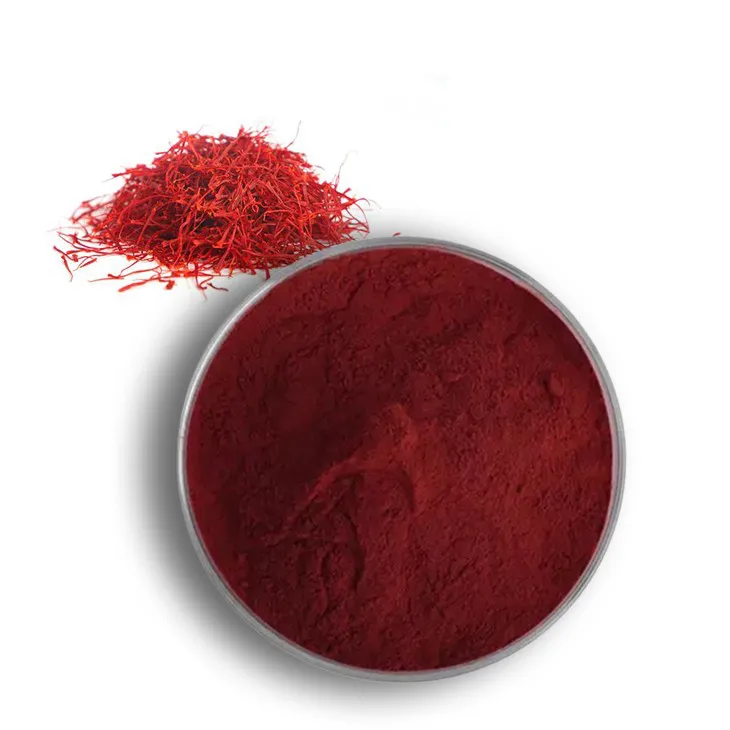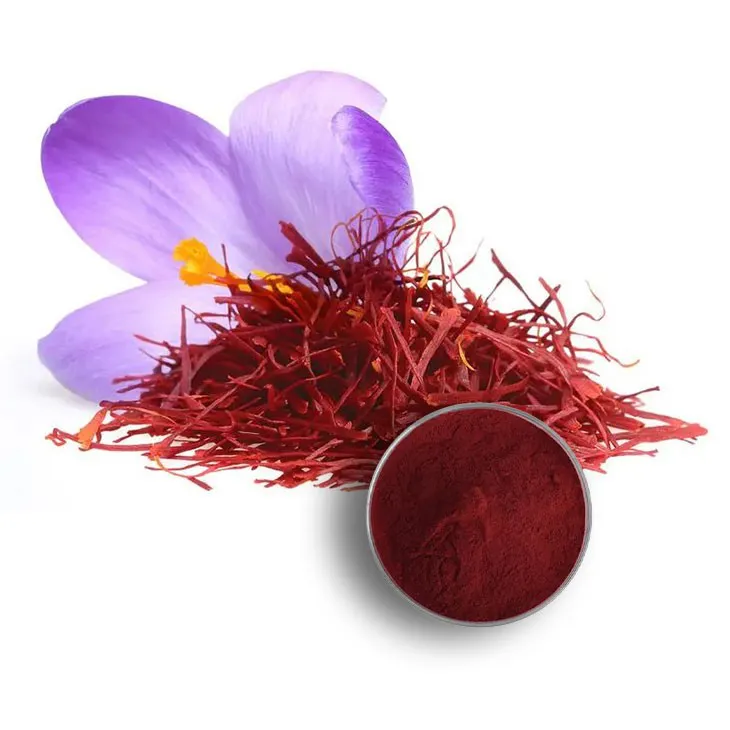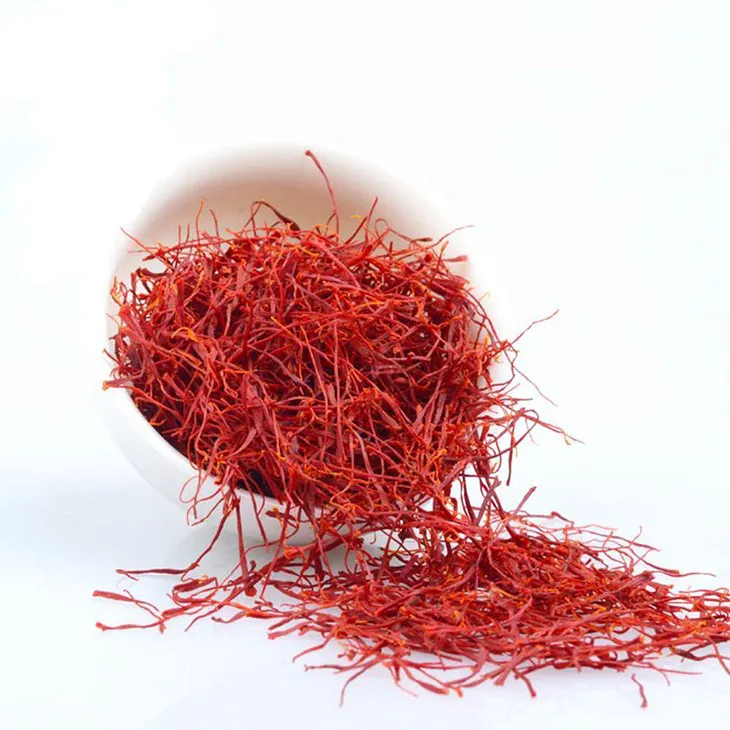- 0086-571-85302990
- sales@greenskybio.com
How do saffron extract powder manufacturers wholesale and customize products?
2024-12-18

Introduction
In the realm of botanical extracts, Saffron Extract Powder has emerged as a highly valuable and versatile product. With its numerous applications in various industries such as food, cosmetics, and pharmaceuticals, manufacturers of Saffron Extract Powder play a crucial role in meeting the market demands. When it comes to wholesale and customization, these manufacturers face a unique set of challenges and opportunities that require careful consideration and strategic planning.

Wholesale of Saffron Extract Powder
1. Understanding Market Demand
Market research is the foundation for successful wholesale operations. Different regions around the world have diverse needs for saffron extract powder. For instance, in some European countries, there is a high demand for saffron extract powder in the food industry. It is used as a natural flavoring agent in high - end cuisine, such as in saffron - flavored rice dishes, pastries, and soups. In Asia, particularly in countries like India and Iran where saffron has a long - standing cultural significance, it is used not only in food but also in traditional medicine.
In the cosmetics field, saffron extract powder is sought after for its skin - enhancing properties. In regions with a growing beauty market, such as North America and parts of Asia - Pacific, the demand for saffron - based cosmetics, including creams, lotions, and face masks, is on the rise. Manufacturers need to be aware of these regional differences in order to target the right markets and adjust their production and marketing strategies accordingly.
2. Pricing Strategies
Pricing is a critical aspect of wholesale. It is not simply a matter of covering the costs but also a strategic decision to gain a competitive edge. The cost of raw materials is a major factor. Saffron, being one of the most expensive spices in the world, significantly impacts the cost of saffron extract powder production. The quality of saffron used, whether it is of high - grade or lower - grade, will also affect the cost.
Production costs include factors such as extraction methods, processing equipment, and labor. Modern extraction techniques, such as supercritical fluid extraction, may be more expensive but can produce a higher - quality extract. Manufacturers need to balance the cost - effectiveness of different extraction methods.
Additionally, competition analysis is essential. Manufacturers must study their competitors' pricing. If there are many competitors in the market offering similar saffron extract powder products, pricing too high may lead to loss of market share, while pricing too low may result in reduced profit margins. They may also consider offering different price tiers based on product quality, quantity, or added - value services such as faster delivery or custom formulation for large - volume customers.
3. Quality Control
Quality control is non - negotiable in the wholesale of saffron extract powder. Maintaining the purity of the extract is crucial. This means ensuring that there are no contaminants or impurities in the powder. Impurities can not only affect the performance of the product in its intended applications but also pose potential health risks in the case of products for human consumption.
Potency is another important aspect. The active compounds in saffron, such as crocin, picrocrocin, and safranal, should be present in sufficient quantities. Manufacturers need to have reliable testing methods in place to measure the potency of their extract powder. This may involve in - house laboratories or outsourcing to specialized testing facilities.
To ensure quality control, manufacturers should also follow strict good manufacturing practices (GMP). This includes proper handling of raw materials, clean and hygienic production facilities, and accurate documentation of the production process. Regular audits of the production process can help identify and rectify any potential quality issues before the products are distributed in the wholesale market.

Customization of Saffron Extract Powder
1. Formulation Adjustment
When it comes to customization, manufacturers must be able to work closely with clients to adjust the formulation of saffron extract powder. Different clients may have specific requirements depending on the end - use of the product. For example, in the food industry, a client may require a saffron extract powder with a lower concentration for use in a mass - produced, mildly - flavored product like a ready - to - drink tea.
In the cosmetics industry, a brand may need a higher - concentration saffron extract powder for a luxury anti - aging cream. Manufacturers need to have the technical expertise and flexibility to create different formulations to meet these diverse needs. This may involve modifying the extraction process, adding or removing certain co - ingredients, or adjusting the ratio of active compounds in the extract.
2. Packaging Options
Packaging is an important part of customization. For large - scale wholesale, bulk packaging may be preferred. This could be in the form of large drums or bags for cost - effectiveness and ease of transportation. However, for niche markets or specialized products, customized small - sized packaging is often required.
For example, in the case of a high - end saffron - based cosmetic product targeted at a luxury market, the packaging may need to be elegant, small, and designed to attract the target customers. In the food industry, single - serve packets may be needed for products like saffron - flavored instant coffee or tea. Manufacturers need to be able to offer a variety of packaging options to meet the different requirements of their clients.
Additionally, packaging materials should be carefully selected to ensure the protection and stability of the saffron extract powder. For products with a longer shelf - life requirement, such as those in the pharmaceutical or nutraceutical industries, packaging materials with high - barrier properties may be necessary to prevent degradation of the active compounds.

Conclusion
In conclusion, manufacturers of saffron extract powder face a complex but potentially rewarding task when it comes to wholesale and customization. By carefully understanding market demand, formulating appropriate pricing strategies, and maintaining strict quality control in wholesale, and by being flexible and responsive in customization, they can not only meet the needs of their clients but also build a strong brand and a successful business in the competitive market of saffron extract powder.
FAQ:
Q1: What are the key factors in setting the price for saffron extract powder in wholesale?
The key factors in setting the price for saffron extract powder in wholesale include not only the cost of raw materials and production but also competition analysis. The cost of raw materials, which are often scarce and costly due to the labor - intensive process of saffron harvesting, forms a significant part of the overall cost. Production costs such as extraction processes, equipment maintenance, and labor also need to be considered. Additionally, analyzing the prices set by competitors in the market helps manufacturers to position their products competitively while still ensuring profitability.
Q2: How do saffron extract powder manufacturers ensure quality control during wholesale?
Manufacturers ensure quality control during wholesale by implementing strict measures at every stage of production. Firstly, they source high - quality saffron as the raw material. Then, during the extraction process, they use advanced extraction techniques and equipment to ensure the purity and potency of the extract powder. Regular testing is carried out to check for contaminants, ensure accurate concentration levels, and verify the overall quality. Documentation of all quality - related processes is also important for traceability and to meet regulatory requirements.
Q3: What are the typical customization options for saffron extract powder?
The typical customization options for saffron extract powder include adjusting the formulation and packaging. Regarding the formulation, manufacturers can create different concentrations of the extract powder according to specific client requirements. For example, a higher concentration may be needed for certain pharmaceutical applications, while a lower concentration may be suitable for food flavoring. In terms of packaging, they can offer both bulk packaging for large - scale wholesale and customized small - sized packaging for niche markets. Customized labeling can also be provided to meet the marketing or regulatory needs of different clients.
Q4: How do manufacturers identify and meet different market demands for saffron extract powder?
Manufacturers identify different market demands for saffron extract powder through market research. They study trends in various industries such as food, cosmetics, and pharmaceuticals. For example, in the food industry, they look for emerging flavor trends that may incorporate saffron. In cosmetics, they keep track of skin - care product developments that could benefit from saffron's properties. To meet these demands, they then adjust their production processes. For instance, if there is a growing demand for saffron - based dietary supplements, they may increase the production of higher - potency extract powder and ensure compliance with relevant health and safety regulations.
Q5: What challenges do saffron extract powder manufacturers face in customization?
Manufacturers face several challenges in customization. One challenge is the need to balance meeting specific client requirements while maintaining product quality and consistency. For example, adjusting the formulation to create a unique product for a client may require careful experimentation to ensure that the potency and purity of the extract powder are not compromised. Another challenge is the cost associated with customization. Developing new formulations and providing customized packaging may increase production costs, which need to be managed carefully to ensure profitability. Additionally, meeting regulatory requirements for customized products can be complex, especially when the product is intended for different markets with varying regulations.
Related literature
- Saffron: Botany, Chemistry, and Pharmacology of an Ancient Spice"
- "The Production and Quality Control of Botanical Extracts: A Focus on Saffron"
- "Saffron Extract in the Food and Cosmetic Industries: Market Trends and Customization"
- ▶ Hesperidin
- ▶ Citrus Bioflavonoids
- ▶ Plant Extract
- ▶ lycopene
- ▶ Diosmin
- ▶ Grape seed extract
- ▶ Sea buckthorn Juice Powder
- ▶ Fruit Juice Powder
- ▶ Hops Extract
- ▶ Artichoke Extract
- ▶ Mushroom extract
- ▶ Astaxanthin
- ▶ Green Tea Extract
- ▶ Curcumin
- ▶ Horse Chestnut Extract
- ▶ Other Product
- ▶ Boswellia Serrata Extract
- ▶ Resveratrol
- ▶ Marigold Extract
- ▶ Grape Leaf Extract
- ▶ New Product
- ▶ Aminolevulinic acid
- ▶ Cranberry Extract
- ▶ Red Yeast Rice
- ▶ Red Wine Extract
-
Hops Extract
2024-12-18
-
Buckthorn bark extract
2024-12-18
-
Pueraria Lobata Extract
2024-12-18
-
Avocado Extract Powder
2024-12-18
-
Yellow Pine Extract
2024-12-18
-
Scutellaria Extract
2024-12-18
-
Rose Hip Extract
2024-12-18
-
Curcuma Longa Extract
2024-12-18
-
Quercetin
2024-12-18
-
Astaxanthin
2024-12-18





















